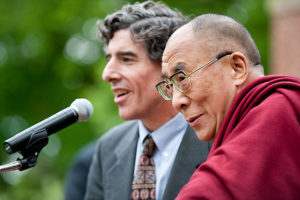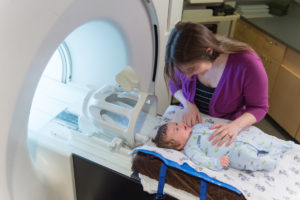Psychological well-being remains one of the most powerful predictors of success and health in life. Yet one in five youth in the United States experience a mental health disorder, a reality that drives research-based solutions at the Center for Investigating Healthy Minds at the Waisman Center and the School of Education at the University of Wisconsin-Madison.
With a $10 million gift from UW-Madison Alumna Dorothy “Dottie” Jones King (’58) and her husband, Robert “Bob” Eliot King, the university will be able to recruit new interdisciplinary faculty that focus on children and well-being to the Center and the School of Education.
“We’re thrilled to collaborate with UW-Madison in our determination to help disadvantaged youth reach their full potential,” says Dottie Jones King. “We believe the work of Richard Davidson and his colleagues at the Center will have a tremendous impact and help thousands – if not millions – of youth thrive.”
Center scientists and staff look forward to a partnership with the Thrive Foundation for Youth, a foundation founded by Dottie and Bob King with their family. The foundation focuses on intensive, caring adult engagement with disadvantaged youth with current grantees in cities such as Chicago, Oakland, Portland, Denver, New York and Washington D.C. With these and other organizations, the team is interested in developing assessments for children and young adults between 10 and 18 years of age — a time period known to be critical for emotional development and the brain.
Through neuroscientific research conducted at the Center and at other research organizations, an increasing body of evidence indicates that adolescence is a period when the brain is more sensitive and pliable and presents opportunities to build critical emotional skills to cultivate well-being. The Center is leading the development and assessment of mental training strategies derived from contemplative traditions to cultivate healthy qualities of mind in children and adolescents.
“We’re thrilled to collaborate with UW-Madison in our determination to help disadvantaged youth reach their full potential. We believe the work of Richard Davidson and his colleagues at the Center will have a tremendous impact and help thousands – if not millions – of youth thrive.”
“Assessment remains a huge challenge for the field, but it’s what’s critically needed to answer important questions,” says Richard Davidson, Founder of the Center and William James and Vilas Professor of Psychology and Psychiatry. “How does one measure development of noncognitive factors? How do those measures change with students’ age? Are there some interventions more effective than others? We need to build a common language to measure success.”
Davidson says the collaboration contributes to larger efforts underway to ensure that children have the best chance to succeed in life. In school systems, value has often been placed on cognitive ability, but recent research exploring the importance of social emotional skills such as awareness, self control and pro-social behaviors suggests the need for noncognitive learning as well.
Rebecca Blank, Chancellor of UW-Madison, says the gift is vital for the university to continue pioneering high-impact strategies in the state of Wisconsin and beyond.
“The University of Wisconsin-Madison has long been involved in research to improve the lives of children, and this gift helps us continue to pursue groundbreaking research in this area,” Blank says. “I am grateful for the support of outstanding alumni like Dottie Jones King and the partnership with the Thrive Foundation for Youth that helps us pursue research and education that truly makes a difference in Wisconsin and beyond.”
Faculty recruits to the Center and School of Education were also made possible through the generosity of longtime university supporters John and Tashia Morgridge, who inspire and match donations for new and enhanced professorships.
“We are pleased that part of our gift will be used to support the generous matching gift established by John and Tashia Morgridge,” says Bob King. “We have always believed in leveraging our philanthropy with others’ efforts, and are thrilled to be partnering with the Morgridges to support the university and the extensive reach its research has throughout the world.






